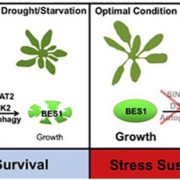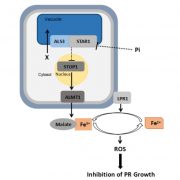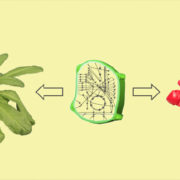Molecular basis of salt sequestration in epidermal bladder cells of Chenopodium quinoa
 The recent focus on quinoa is a result of not only its high nutritional value, but also its astonishing salt stress tolerance. Epidermal bladder cells (EBC) are suspected to be a cause of salinity tolerance by serving as salt dumping place. In order to identify molecular mechanisms underlying salt sequestration, Bohm et al. performed transcriptome analysis of EBC under control and salt stress conditions. The salt-induced changes in the EBC transcriptome were minimal. The group identified a number of transporters specific to EBC involved in sodium loading into the EBC (CqHKT1.2) and chloride transport into the vacuole of EBC (CqClc-c). Although the leaf was identified as the major proline production site, EBC-specific potassium and proline transporters were hypothesized to keep the EBC osmotically balanced. (Summary by Magdalena Julkowska) Curr. Biol. 10.1016/j.cub.2018.08.004
The recent focus on quinoa is a result of not only its high nutritional value, but also its astonishing salt stress tolerance. Epidermal bladder cells (EBC) are suspected to be a cause of salinity tolerance by serving as salt dumping place. In order to identify molecular mechanisms underlying salt sequestration, Bohm et al. performed transcriptome analysis of EBC under control and salt stress conditions. The salt-induced changes in the EBC transcriptome were minimal. The group identified a number of transporters specific to EBC involved in sodium loading into the EBC (CqHKT1.2) and chloride transport into the vacuole of EBC (CqClc-c). Although the leaf was identified as the major proline production site, EBC-specific potassium and proline transporters were hypothesized to keep the EBC osmotically balanced. (Summary by Magdalena Julkowska) Curr. Biol. 10.1016/j.cub.2018.08.004









